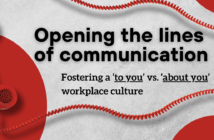Tips for building a winning team with staff members of all ages
by Carter Davis
Regardless of industry, economic conditions, or the available talent pool, a common, consistent challenge among hiring managers and recruiters has been finding the best people with the most desirable character traits to build a top-performing team. Yet, it’s surprising how many employers go about doing this without having a firm plan in place. If you were to ask the general manager of any successful sports team what his or her strategy is for building a championship team, you’d get a host of answers, but surely none of them would say, “Eh, we just wanted warm bodies to fill the vacant spots, and we got lucky.”

RVECTOR/SHUTTERSTOCK.COM
Trying to build a winning team without a plan is like trying to sail across the Atlantic Ocean without a map. Or a sail. But the good news is that putting a plan in place for building your team isn’t terribly difficult.
And here’s the best part: Having a talented and well-trained staff in place puts the business in a better position for growth while simultaneously attracting top employee talent. With demand for top-shelf employees in the hospitality industry at a premium, competition between hotels for those employees can be stiff. So, how can you build the best team possible given the ultra-competitive atmosphere?
What Do You Need?
The obvious (and short) answer to this question is that you need good people. And to get those good people, it’s vital to recognize that all positions within the business are a crucial part of its success. Similarly, hiring managers and recruiters have sometimes expressed biases toward certain age groups of employees: “Millennials are entitled. Gen Xers are stuck in their ways, etc.” But any truly successful team must be made up of talented people of all ages, skills, and backgrounds. By making a conscious effort to limit the pool of potential employees to one age bracket, for example, you shortchange yourself, your colleagues, and your guests.
According to a recent white paper published by the Society of Human Resources Managers Foundation, “By removing the lens of age as a way to view existing or potential employees, you can shift the focus to their abilities, skills, experience, and knowledge where it belongs. You also will expand the talent recruitment pool, which ultimately benefits the organization.”
And those benefits can be easily identifiable. “Workers 50+ may increase your revenue by three percent,” the SHRM Foundation adds, “and reduce your turnover costs – all while bringing guidance, expertise, and balance to your company.”
And beyond the issue of excluding potential employees based on age being a tactic that will shortchange your team from a personnel perspective, this practice opens up employers to a host of legal liabilities.
Get There from Here?
Understanding and acting on the simple concepts of workers of different ages bringing unique skills to the team and implementing a concrete plan for recruiting the most talented team members possible can yield tremendous benefits down the line. Even staff members operating behind the scenes – housekeeping, food prep, purchasing, marketing, accounting, IT, etc. – play a role in the guest experience. Even if they never interact with guests in person, all hires should be treated with equal importance. A strong structure can’t be built on a weak foundation, and negative attitudes or poor performances behind the scenes can quickly infect those in guest-facing roles.
For those staff members in guest-facing roles, it’s important to consider their verbal abilities and capacity for empathy. When confronted with a dissatisfied guest, how will a staffer respond? Does he or she have a listen-first, respond-last personality, or is this someone who tries to find a solution before hearing the problem? Worse, is this someone who passes blame or will this person accept responsibility for failure and work on self-improvement?
As humans, we’re all subject to emotions – staff and guests alike. However, the customer is always right, and this means that staff often has to keep emotions in check when presented with a stressed or unhappy guest.
When faced with these situations – whether it’s the manager, the concierge, or the front desk attendant – the task remains the same: Solve the problem quickly and to the guest’s full satisfaction. Fortunately, this is an ability you can easily identify in the interview process, even if the applicant has no hospitality industry experience. What problems has this person solved at previous jobs? What challenges has this person faced and overcome? Has this person had to adapt to rapidly changing circumstances before?
As practice shows, people who truly shine in these tense situations are hard to find, but they do exist. And if you are having trouble locating new hires with the exact talents you need, don’t hesitate to look internally for solutions. For example, if you have a behind-the-scenes staffer who consistently displays a knack for solving difficult problems while maintaining an even keel, it’s worthwhile to explore moving that person into a guest-facing role. Sometimes, the best solutions are the ones right under your nose.
Similarly, when filling vacant managerial positions, it can be tempting to look outside the industry for recent college grads with relevant degrees in search of employment. While there’s certainly nothing wrong with that approach, hospitality can be a learn-by-doing industry. And although many higher-education institutions offer a degree program in hospitality management, your next great management hire could be the person who has been parking cars or manning the front desk to make ends meet while pursuing a different course of study in college.
Because every task leaves an imprint on the business, each job is of equal import with regards to guest experience and quality of service delivered, and awareness of this fact during the interview process offers the interviewer the chance to better tailor the questions for the duties of the job itself. You can always teach skills, but it’s much harder to teach core competencies like initiative, drive, and common sense.
Ultimately, no matter who you hire, the management team is responsible for instilling a sense of ownership and pride among the staff. And a business operated by attentive management will be much more efficient, as that manager can quickly respond to crises in real time. With involved management, conflicts and internal divisions can be identified and remedied at the stage of inception. With an out-of-touch managerial team, problems are much likelier to fester until they’re too large to contain or solve without considerable fallout.
By and large, the competitiveness of any enterprise depends on the abilities of its on-the-ground leadership, and management should continually review the various operational components of the hotel to create and maintain an organizational and operational strategy with a clear goal in mind of ensuring continued profit and growth. But even having the best operational strategy in the world would be useless without the proper team in place to execute the vision.
If you can hire the right people for the right roles, you’ll have a leg up on your competition.




